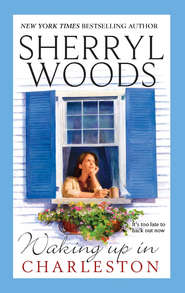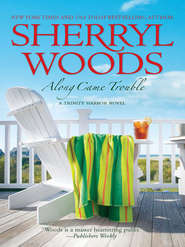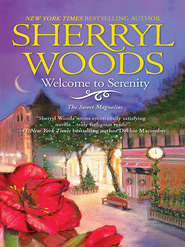По всем вопросам обращайтесь на: info@litportal.ru
(©) 2003-2024.
✖
About That Man
Автор
Год написания книги
2019
Настройки чтения
Размер шрифта
Высота строк
Поля
Relief flooded through her. She was willing to seize any reprieve, however temporary. “Well, then, we’ll just have to wait and see what happens, won’t we?”
Anna-Louise put her hand on Daisy’s. “I know how much you love children. That was evident to me from the minute I got here. And you’ve told me about the doctor’s opinion that you’ll never have children of your own. You’re the best Sunday school teacher we have, as well as the best history teacher at the high school. The kids adore you. You’d be a terrific mother to Tommy, and you deserve this, Daisy, you really do, but it might not work out. I just want you to be prepared to let go.”
“God would not bring Tommy into my life and then snatch him away,” Daisy countered.
“We don’t always know or understand what He plans for us,” the minister reminded her. “We just have to accept that He has our best interests at heart.”
How could losing Tommy be in her best interests? Daisy felt the sting of unshed tears at the back of her eyes. “What do you know about this uncle? He and Tommy’s mother can’t have been close. He didn’t come for the funeral.”
“He’s a cop in D.C. Beyond that, I don’t know much. Frances was fairly stingy with what she considers to be confidential information. She just wanted me to prepare you.”
“Is he married?”
“I don’t think so.”
“Then why would he be any better suited to care for Tommy than I am?”
“It isn’t a matter of ’better.’ It’s a question of family. He and Tommy are related.”
Daisy wanted to argue that a loving stranger might be better for Tommy than a bad relative, but until she met this man and knew the whole story, she had no cause to stand in judgment of him. Anna-Louise was likely to tell her she didn’t have the right even then. Judgment was God’s business.
And so it was, Daisy thought. But just in case He had other things on His mind besides Tommy Flanagan, she intended to look this uncle over very carefully before she relinquished Tommy to his care.
3
D riving into Trinity Harbor, Walker shuddered. It was exactly the way his boss had described it. Quaint. Picturesque. Charming. Slightly faded, like a fancy dress left hanging in the closet too long, but with a hint of past glories. Lawns were well-tended. There were churches every few blocks, some of them clearly quite old. And every now and again there was a glimpse of the Potomac, shimmering in the bright sunlight.
He hated places like this. Give him a little grit and grime any day. Give him bustling sidewalks and clogged highways. Give him skyscrapers and run-down neighborhoods. He knew the rules of survival in a city like D.C. He liked the anonymity. He didn’t know beans about getting along in a town where everybody knew your name and your business.
He followed the directions Frances Jackson had given him, drove on through the town of Trinity Harbor, then past open farmland just sprouting green, through the county seat in Montross until he came to what looked more like a remodeled school building than a government agency. The discreet sign on the front door proved otherwise. Westmoreland County Social Services, the sign stated in neat letters.
Once he’d turned off the engine, he sat perfectly still, unsure whether he could go through with this. It wasn’t just the thought of having Beth’s death confirmed in black and white in the form of a death certificate. It was all the rest–his nephew, the expectations, and the regrets that he hadn’t found his sister before any of this had happened.
Because of all that, Walker had taken his own sweet time leaving home this morning. He’d stopped by the station, had a chat with Andy, looked through some paperwork, then, finally, when he could delay no longer, he’d hit the road. He’d managed to delay his arrival till midafternoon–much later, no doubt, than the imperious Mrs. Jackson had been expecting him. He braced himself for her displeasure along with everything else, took a deep breath and headed for the door.
Inside, he discovered that Frances Jackson was nothing at all like some of the social workers he’d come across in D.C., dedicated, but wearied by their caseloads. Nor did she fit the image he’d conjured up on the phone–a starchy woman, mid-fifties with a perpetually down-turned mouth. No, indeed, Frances Jackson was nothing like that.
Sixty if she was a day, she had unrepentantly white hair, round cheeks and rounder hips, and eyes that twinkled behind rimless glasses. She reminded him of picture book illustrations of Mrs. Claus. He smiled despite himself, felt himself finally beginning to relax. He could get around a woman like this. He’d be out of here and back to D.C. in no time. Alone.
“You’re late,” she said briskly, but without censure. “Let’s go.” She grabbed her purse and headed for the door.
Once again, Walker was forced to reassess the woman. He’d allowed himself to forget for just an instant that appearances could be deceiving. Right now he had a panicky feeling that she intended to take him straight to wherever this nephew of his was, introduce them, then abandon them to fend for themselves, her duty done. He was nowhere near ready for that. He would never be ready for that.
“Whoa,” he said, standing stock-still in the middle of the corridor. “Where’s the fire?”
“It’s almost dinnertime in these parts and I’m starved, Detective. I missed lunch waiting for you. We can talk over food.” She gave him a thorough once-over. “Besides, next to music, I hear it’s the best thing for soothing a savage beast.”
He chuckled, caught off-guard by the display of humor. “And that would be me?”
“You do pride yourself on it, don’t you? I could tell that when we talked on the phone.”
“In my line of work, it’s helpful,” he said, feeling defensive about his initial display of rudeness when she’d called.
“I’m sure it is,” she agreed. “But down here we like to think we’re more civilized.”
Outside, she gestured toward her car, a brand-new Mustang convertible that surprised him yet again. “I’ll drive,” she said.
He regarded the car with envy. “I’ll be even more agreeable if you’ll let me.”
“Because you don’t trust a woman behind the wheel?”
He heard the unmistakable challenge in her voice, but he didn’t need to lie. “Because I’ve been dying to test-drive one of these babies and haven’t had the chance,” he countered with absolute honesty.
She tossed him the keys. “In that case, it’s all yours, Detective.”
She directed him back onto the highway and into town, then down a side street past the stately old courthouse with its square of grass in front to the Inn at Montross. Walker regarded the historic facade and little flower-lined brick patio doubtfully. Places like this gave him hives.
“Isn’t there someplace we can get a basic burger and some fries?”
“I’ll refrain from commenting on your deplorable eating habits,” Mrs. Jackson said. “I’m relatively certain you’ll find something on the menu here that will do. And they’ve done me a favor by keeping the kitchen open past their usual lunch hour.”
Walker remained skeptical as they climbed the brick steps into the white building that dated back to the 1600s, according to a sign by the front door. He stepped into the wide foyer, glanced around at the antiques and the open, airy rooms and began to revise his opinion. The place had big-city class, he’d give it that.
Without waiting for a hostess, Mrs. Jackson led the way onto a closed-in front porch and settled at a table by an open window. “Sit down, Detective. I promise you the chef can offer more than tea sandwiches.”
Duly chastised, Walker sat. The social worker regarded him with amusement.
“I’m sorry I couldn’t offer you a fast-food place. The nearest one is miles away, and I got the distinct impression that you’re in a hurry.”
“Always am.”
“Well, then, as soon as we order, we’ll get right to it.”
Ten minutes later, Walker had a beer in front of him and the promise of a blackened chicken wrap sandwich that would bring tears to his eyes. When it came, Mrs. Jackson watched with amusement as it did just that.
“Too spicy for you, Detective?”
“No,” he insisted, gulping half his beer to tame the taste. “Best sandwich I ever had.” He nodded toward the piping hot potatoes accompanying it. “Best fries, too.”
“Better than a fast-food restaurant?” she inquired, eyes twinkling.
“Are you teasing me, Mrs. Jackson?”
“Just trying to make a point.”
“Which is?”
“The big city doesn’t have all the advantages over us country folks.”











